I have been shooting concerts for many years. These are mostly bands in small, dark, and obscure venues with not much light to work with. But eventually a lot of bands started to use lasers as a part of their show. That resulted once in a damaged sensor. I believe today there is a greater risk with mirrorless cameras and lasers.
I started photographing concerts back in the nineties, with an analog camera and mostly black and white film. It was so much fun, often being the only one with a camera. I was even allowed to shoot on stage sometimes, like during a concert of the band Tool and stood up front with the band Smashing Pumpkins, which is something that is nearly impossible today. I love shooting in small venues, with a relaxed public behind me, or a moshing pit in front of me, drinking a beer while shooting the artist on stage and enjoying the music.
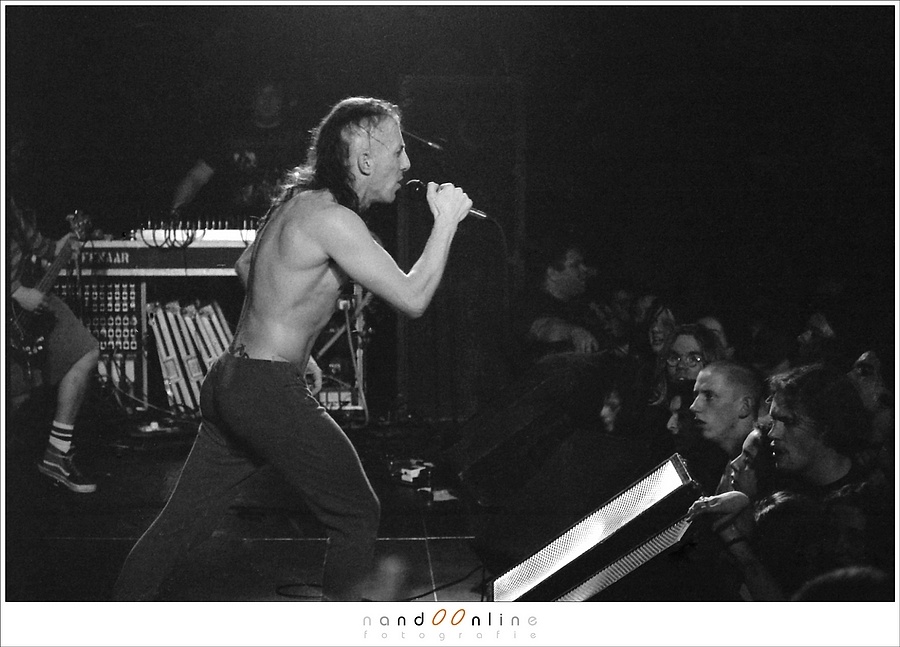
The band Tool, live in 1994 when digital photography was science fiction. Shot with a Minolta X500 and f/2.4 100mm lens on a pushed Ilford HP5 black and white film

Slayer live in 2011. A lot happened since shooting negative film which gave a lot of freedom and possibilities (EOS 1D mark III EF85L.| ISO1600 | f/2 | 1/2500)
Back in those days it was difficult shooting under these conditions, with one or two high sensitivity films, only being able to see the result a few days later. Then came the digital camera and the possibility to use even a higher ISO than ever before, and switching between different ISO values if necessary. But the best thing is being able to see the result right after taking the picture and adjusting the exposure right at the spot if necessary. And then came the laser as part of the light shows.

Oh no... lasers!! Prize winning shot of Helloween during their concert in 2010. (EOS 1D mark III EF35mm | ISO800 | f/3.2 | 1/200)
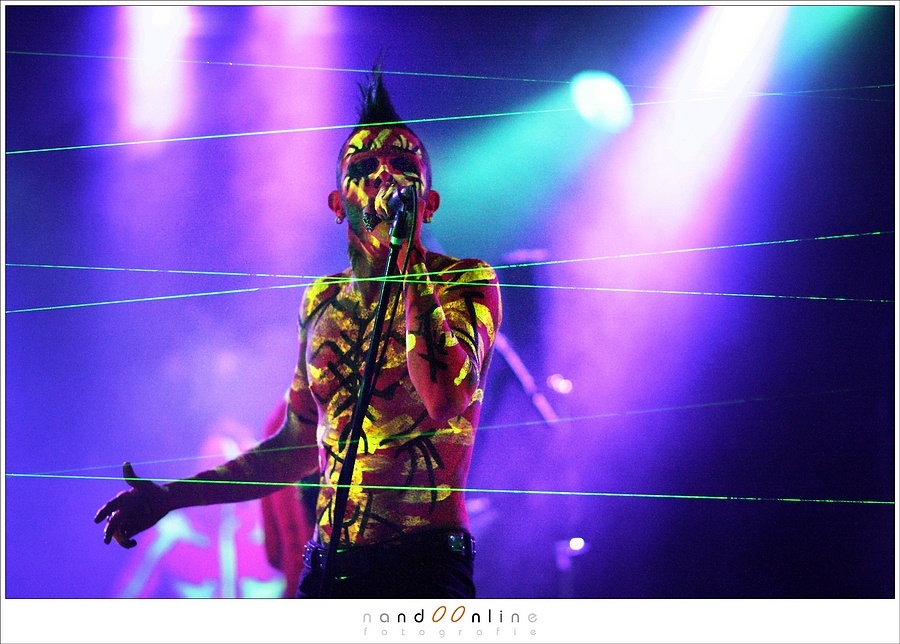
Lasers during the concert of the French punk band Punish Yourself in 2010. All went well during this concert performance (EOS 1D mark III EF85L | ISO2500 | f/1.4 | 1/250)
A laser is an intense beam of light, that can damage your eyes if you look into it for too long. A swift beam of low intensity does not really do any harm. The intensity of the lasers during concerts is not that high, due to safety. I always used the camera without thinking about it because it supposed to be safe, also for a sensor. I mostly used a shutter speed that is just a fraction of a second, too short for a laser to do any harm.
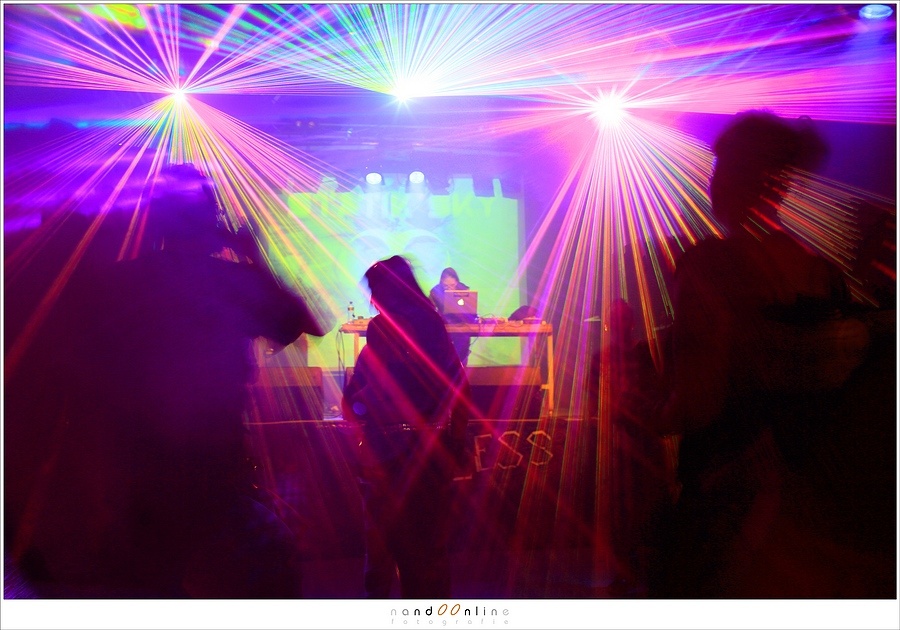
DJ Static Sky used a lot of lasers in 2014 and I tried some experiments with longer exposures, unaware of the risks involved (EOS 5D mark III EF35L | ISO400 | f/5.6 | 0,6sec)
But then it happened. During a concert I decided to experiment a bit with longer shutter speeds to catch the patterns produced by a couple of lasers on stage, with a dancing audience in front. The result wasn't that thrilling, but it was something I liked to try. In the weeks after the concert I looked at some landscape pictures I took and noticed a couple of strange spots in every single picture. And then it hit me; the laser beam I was shooting with a longer exposure did get enough time to burn into the sensor.
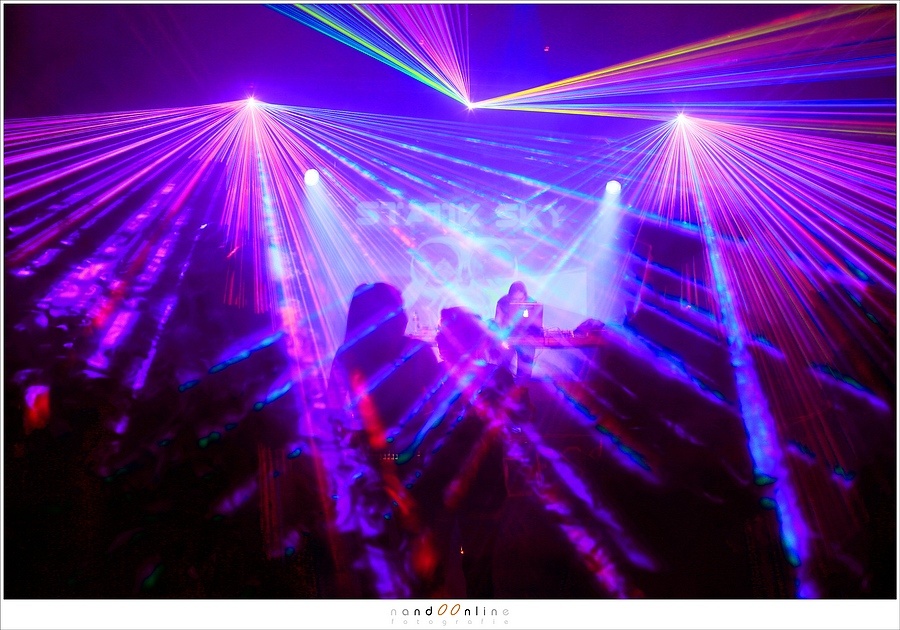
Another try capturing lasers during the concert with long exposure. Perhaps its this shot when things went wrong. Who knows... All I know a laser burned a hole in my sensor during this night (EOS 5D mark III EF35L | ISO400 | f/5.6 | 1/2 sec)
A bit of research on the net showed me more examples of the damage a laser can produce, but they were always during the filming of a laser show. I became clear how dangerous a laser can be for a sensor when its exposed to light for a longer period of time. After bringing it to a Canon repair center the conclusion was clear: the complete sensor of my Canon EOS 5D mark III had to be replaced. The financial damage was almost €500. Fortunately that was payed by the insurance company.

A landscape photo I took in the weeks following the concert and all photos showed exactly the same damage (EOS 5D mark III EF24-70L @ 26mm | ISO100 | f/11 | 1/4sec)

The two rectangles in details with a high contrast inset of the laser burns. It is possible to remove this in Photoshop, but it needs to be done with every photo taken. This has to be repaired and repair means a new sensor.
Today we see the rise of the mirrorless cameras and I believe these modern cameras will find their way to the concert photographer also, if they haven't already. But now I realize there is one important thing to be aware of. With a DSLR the mirror and shutter is protecting the sensor when you are finding a composition, only exposing the sensor during the extreme short time when you take the photo. The change a laser will burn into the sensor is very slim. But with a mirrorless camera the sensor is used constantly, exposing the sensor during a long period. The laser will have much more change of burning into the sensor.

These modern mirrorless cameras are very well capable of shooting concerts. But since the sensor is constantly exposed to light, and lasers when used at a concert, you need to be careful. It would be painful when you end up with a fried sensor. So really... be careful.
Of course there is no reason not to use a modern mirrorless camera for concerts and parties where lasers are used, but I think it is good to be aware of the increased danger a mirrorless camera has. It would be a real shame when you realize the sensor is destroyed during that wonderful show you attended.
Have any of your cameras ever been affected by lasers? What steps do you take to avoid damage?
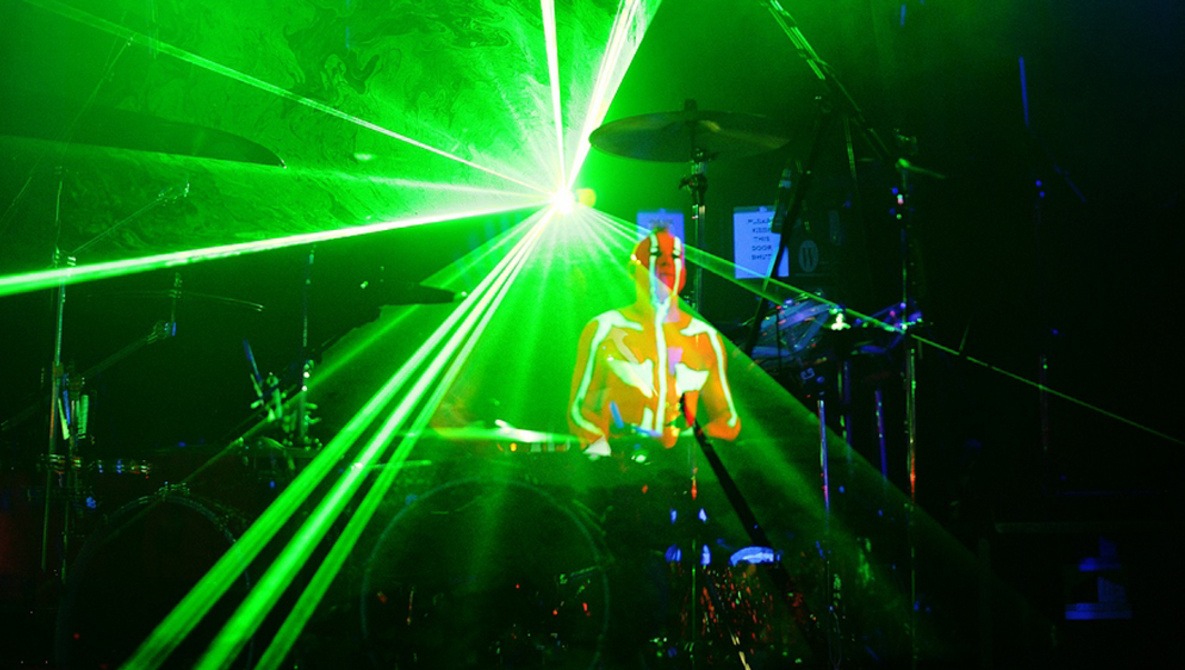






Its not just lasers you can see... https://www.bbc.co.uk/news/technology-46875947
Interesting, this should be an interesting topic as driverless vehicles start saturating the streets like roaches. I wouldn't buy into the notion that they won't damage eyes either, especially when they'll be all over the streets, multitudes of laser beans splattering in all directions. Infrared no less.
I read it just after I posted this article. That certainly will become an serious issue when self driving cars become common.
I can image a warning sticker on the camera and in the manual: "do not use this camera nearby roads and crossings, stay away at least 500 meters from self driving vehicles"
lol
"After bringing it to a Canon repair center the conclusion was clear: the complete sensor of my Canon EOS 5D mark III had to be replaced. The financial damage was almost €500"
Did they know you were insured? Sounds like you were scammed for your insurance coverage. I accidentally destroyed my sensor AND shutter in my Nikon D600, and the total repair cost was $341 US to replace, repair and ship back to me.
No they did not know. Prizes differ, especially between the US and the EU (and even between EU countries), and of course there is something called VAT :)
I was insured with my A7R2 when a DJ's lighting on a wedding last year caused 11+ dead pixels. They would not honour the claim at first (I think twas a standard procedure for them to dismiss it initially) but I was adamant and decided to give me a replacement unit instead of replacing the sensor.
Happy to hear it was honoured. A good example of the dangers.
couples that come to us to shoot their wedding, go through a thorough explanation and videos showing the damage,
they initial the lazer clause and sign the contract. we wont shoot with lazers whatsoever.
this isnt a last minute thing. we wont go through an awkward situation with our clients and the dj for something that could have definitely been prevented.
our friend videographer had his camera zapped and had the cross hairs. the dj is denying its his fault and its in court for over a year now.
we wont take any chance for that. 0 flexibility. we as the photographer also have a say to the work environment we will work in,
Yes. Had a sensor damaged in my E-M5 MK II when shooting in a Lee Ranaldo concert - 3 lines crossing all the sensor, not spots.
You have to be careful with lasers and mirrorless.
I did not realize it is happening already this often. Thanks for sharing your experience. Hope your E-M5 is repaired
Can i damage my camera with a toy-laser pointer ? I want make some overlays with lens flares and light leaks and the laser images could be a very interesting to have ;)
I would not advise that. A simple laser pointer can injure your eye, and a sensor is more sensitive than your eye.
I would rather use a light bulb for that
there are videos of toy lens pointers on youtube showing it burned pixels in the smartphone. it may be ok with a regular camera, but hell if id take a chance for an image.
Even with a regular camera I wouldn't dare, when the shutter opens the sensor is exposed. But perhaps a shutter time between 1/8000 and 1/30 (a guess) is short enough to minimize the risk.
yes possibly. what you can do is shoot with the lazer coming from your back so it doesnt go directly to the sensor. ricochet off something and back to sensor? minute chance imo.
but im too scared to even try. my cameras cost too much for me to take chances. this panic came to me when my good videographer friend had his camera zapped. dj denies it being his gear because "its too low a power" although the video clearly shows it was as direct shot. now hes in court 9 months and waiting, and meanwhile hes out of money and camera.
It was probably cheaper buying a new camera. A good insurance is also important
If your camera is damaged, I presume you will be liable. If your eyes are injured, that will be another problem and in that case the venue. But I never heard about eyes that got burned by a laser during laser show in venues
But I can be mistaken about liability
.
"Of course there is no reason not to use a modern mirrorless camera for concerts and parties where lasers are used..."
Sounds like there is though.
hahaha, you're are right.
I just don't want to give the idea you shouldn't use mirrorless cameras during concert. Just be careful
Exactly. As the article proves, there is a very big reason not to use a modern mirrorless camera where lasers are used.
You had me at Tool...
Did I?
:)
In general, camera sensors are much more sensitive to excess light, including laser light, than human eyes.
Laser usage could be perfectly safe for human eyes ... but still could be too strong for camera sensors.
For this reason, you should not let a direct or reflected laser beam enter your camera lens. A "direct beam" means a straight line from the laser projector (or a straight line bouncing off a mirror).
You can take all the photos you want of laser patterns in the air, laser beams going across the field of view, etc.
Note that there is no law or regulation limiting laser light to protect camera sensors. Also, the International Laser Display Association (ILDA) says that due to the wide variety of cameras out there, "it is not possible for laser show producers to be responsible for all cameras and camcorders which might be at a show."
So it is up to you as a photographer to keep beams from directly entering your lens.
More on this is at the ILDA website: http://www.ilda.com/camera-sensor-damage.htm
Yes but what about when you can't see the beams, as Andrew Eaton has pointed out above?
Then it will be a real surprise when your sensor get ruined.
I think the change is still very slim, but perhaps in the future when self driving cars will be more common.
Has anyone tried using a polarized filter to protect from laser light? Laser light is polarized. So a polarizing filter should block any laser light not aligned with the polarization of the filter. Of course who knows what angle the laser light is polarized to. Still a polarized filter should be better then no protection.
I did not realize that. Thanks for that thought. But tilting the camera or a moving/rotating laser would make use of that polarization almost impossible. I guess only a fixed setup (laser and polarization filter) could work
Blown a Canon 60d, carrying on my shoulder with the mirror up, 5D Mark II completely destroyed, another 5D mark ii damaged with purple spots and at the same venue a guest photographer blew a Nikon d50, completely destroyed first shoot, and $16,000 sony video camera damaged with purple spots by a guest videographer. There were 4 lasers at the venue, 2 at each end pointing at the middle.This in 10 years... I still shoot there twice a weak only with DSLRs, not mirrorless.